CRI DIVISIONS
CRI consists of four divisions, Research, Biosecurity and CIS, Extension and Finance and administration. Within Research there are couple of portfolios and programs. Here is a short overview of the various divisions, their mandates and their portfolios.
RESEARCH DIVISION
Citrus research in southern Africa, largely funded by a levy on export cartons, is divided into three portfolios.
Within each focused portfolio are several programmes on particular problem areas identified by the citrus industry. A Programme Coordinator oversees the research conducted within each programme and this may be conducted at various institutions. Programme Coordinators can also belong to different institutions. Within Citrus Research International (Pty) Ltd, Dr. Sean Moore manages the Research Division and serves as deputy to the Chief Executive Officer, Dr. Vaughan Hattingh who is based at the University of Stellenbosch.
Portfolios in this division
Simply click the above tabs to view the different portfolios and their programmes.
The buttons below offer a shortcut to the publications in each division.
| PORTFOLIO MANAGER: Dr. Paul Cronje |
|
The primary aims of the CRI Citricultural research group are to (1) produce a large volume of quality fruit (ton/hectare) and (2) remain cost-efficient during production and export (R/carton) – two fundamental principles of successful commercial citrus fruit production. By ensuring the above two key aims are achieved the global competitiveness of the southern Africa citrus growers will be sustained. In order to develop and maintain a long-term research strategy that will ensure grower competitiveness with the limited number of researchers available. To realise the two key principles of successful commercial citrus fruit production above, the CRI Citricultural research group will address research priorities in the following three categories. ON-FARM PROFITABILITY This aspect includes basic citricultural research in areas such as irrigation, nutrition and crop manipulation as well as cultivar and rootstock selection. In an established industry, such as the southern African citrus industry, an incrementally growing body of knowledge is vital for growers to make long-term strategic decisions in an industry dependent on long-term investments. The CRI Citricultural research portfolio is focused to ensure that growers stay in the citrus game, viz. realising high yield of export quality fruit at a competitive production cost. MAJOR TECHNICAL CHALLENGES The solving of major production problems, such as various rind disorders and alternate bearing, is challenging due to major gaps in the fundamental knowledge of citrus physiology. Advancement in these types of projects is not easily measured in practical outputs. However, it is pertinent that adequate resources (funding and research time) be allocated to these projects because it is the only avenue to find orchard-level solutions. MAJOR FUTURE CHALLENGES The lack of attention to issues that fall into this category could be potentially catastrophic for the southern African citrus industry. One such challenge is the failure of, or problems associated with, the cold sterilisation protocol (-0.6°C for 24 days). In addition, the deterioration of fruit quality associated with container shipments of citrus could result in a loss of market share in this very important and growing part of the world economy. |
|
|
| PORTFOLIO MANAGER: Dr. Jan van Niekerk |
| Research and services conducted by researchers in the Disease Management portfolio focus on all economically important Pre- and Postharvest diseases of citrus. By serving CRI’s mission to maximise the long-term global competitiveness of the southern African citrus growers, our vision is “To be a centre of excellence in providing a balanced and co-operative citrus pathology research and services portfolio that serves grower needs and priorities and ensures sustainable market access and optimised production, quality and exports”. |
|
|
| PORTFOLIO MANAGER: Dr. Aruna Manrakhan |
| The southern African citrus industry is committed to pursuing a biointensive integrated pest management (IPM) approach and consequently much research is focussed on development of such strategies. The importance of market access and the retention thereof, and the need to effectively manage phytosanitary pests to achieve this, is also at the forefront of much of the research conducted within the IPM Portfolio. Strategies to manage both indigenous and introduced pests using a biorational approach, require continual modification as available plant protection products change, pest status or distribution changes and horticultural practices change. |
|
|
Shortcuts to the publications in each division
CITRUS IMPROVEMENT SCHEME



OBJECTIVE
The objective of the Citrus Improvement Scheme (CIS) is to increase the profitability of the southern African Citrus Industry, by ensuring that growers are supplied with nursery trees of the highest possible quality made from the best genetic citrus material and being free from any harmful pathogens.
ESTABLISHED
The CIS was established in 1973 as a joint project between the SA Co-operative Citrus Exchange and the Citrus and Subtropical Fruit Research Institute (CSFRI). During the interim phase certified budwood was obtained from trees of various cultivars that were selected in commercial orchards. In 1977, shoot-tip grafting was introduced at the CSFRI in order to provide a virus-free source of budwood material. The Outspan Foundation Block was established in 1980, releasing the first virus-free certified budwood in 1984 and the first certified seed in 1986. From April 2002, Citrus Research International became responsible for the CIS and the Citrus Foundation Block (CFB).
CERTIFIED PROPAGATION MATERIAL
Budwood
New cultivars are obtained from the discovery of mutations in orchards, breeding programmes and/or the importation of promising cultivars from other countries. Since the deregulation of the citrus industry in 1997, many private cultivar management agents have also become involved in this process and the Citrus Growers Association now has their own Cultivar Company for cultivar development. The Agricultural Research Council – Tropical and Sub-tropical Fruit and the CRI’s Citrus Research Centre in Nelspruit are responsible for shoot-tip grafting and pre-immunisation of material with a mild strain of Citrus Tristeza Virus (CTV). The Citrus Foundation Block is responsible for increase and release of propagation material to the citrus industry. All promising cultivars are planted in suitable trial sites and evaluated by CRI Cultivar Specialists. These processes are mainly conducted by CRI and ARC personnel, but the CIS Advisory Committee and its Pathology and Cultivar sub-committees play and oversight and advisory role in these processes.
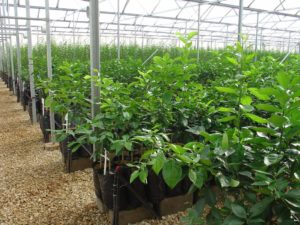
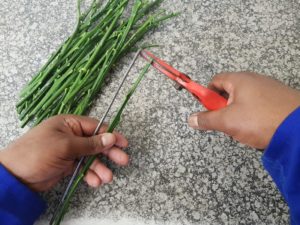
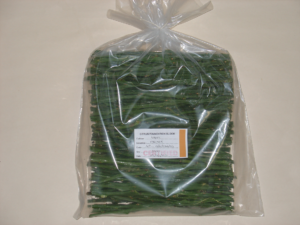
Phytosanitary quality of budwood produced at CFB. All cultivar lines are introduced to CFB after pathogen elimination by means of shoot-tip grafting. These virus-free lines are then pre-immunised with a mild strain of CTV to cross-protect against this disease, which is endemic to southern Africa. Budwood produced are produced inside insect-secure structures according to strict phytosanitary guidelines to prevent new infections. All budwood multiplication blocks are re-tested once every 3 years to ensure their pathogen freedom. Additionally, the CFB is inspected once annually by a team of citrus pathologists and entomologists to evaluate its phytosecurity.
Seed
At present, 23 different rootstock cultivars are grown at CFB, with the aim of supplying good quality disease-free citrus seed as demanded by the southern African citrus industry. Surplus seed is exported to countries such Afghanistan, Angola, Australia, Botswana, China, Chile, Democratic Republic of the Congo, Dominican Republic, Egypt, Kenya, Morocco, Mozambique, Namibia, Portugal, Réunion, Spain, Thailand, United Arab Emirates, Zambia and Zimbabwe.
Seed from the following rootstock cultivars are available in commercial quantities from CFB (Seed Order Form).
- Benton citrange
- C35 citrange
- Carrizo citrange
- Cleopatra mandarin
- Flying Dragon
- M×T (Minneola × Trifoliate)
- Rough lemon Cairn
- Rough lemon Schaub
- Swingle citrumelo
- Troyer citrange
- US812 (Sunki × Benecke)
- Volckameriana
- X639 (Cleo × Trifoliate)
- Yuma citrange
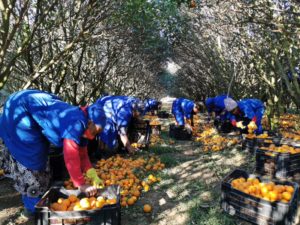
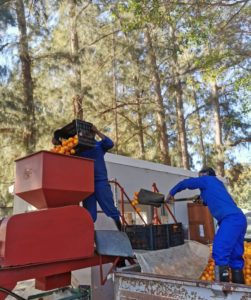
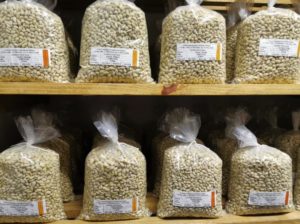
Phytosanitary quality of seed produced at CFB. Due to the general disease-free status of the CFB, the fact that very few pests and diseases are seed transmissible, and the safe rootstock seed processing and treatment procedures employed by the CFB, the certified rootstock seed from the CFB can be regarded as Safe Seed (CFB Safe Seed 2021), and generally meets the import requirements for most countries.
NURSERY CERTIFICATION
Nurseries producing certified trees must be certified in accordance with a quality management system and are audited twice a year for this purpose. A certified tree must be made from certified propagation material, tested for soilborne pathogens 4 times per annum, and found to be free of harmful pests and pathogens before delivery. (CIS Tree Standards)
As a result of a sharp decline in demand for trees, the number of nurseries participating in the CIS decreased from 46 in 1999 to 21 in 2012. This has increased again to 37 in 2020. An application has been submitted to the Department of Agriculture to make the CIS a statutory scheme, which, if approved, will make the sale of uncertified trees unlawful. Tree certification is a pre-requisite for Global GAP accreditation.
The CIS supplies seed and budwood to any nursery wanting to make citrus trees; however, only nurseries participating in the SA Nursery Certification Scheme will be audited and certified. The list of certified nurseries can be downloaded here, (CIS Certified Nurseries).
POSTAL
CRI Citrus Foundation Block
PO BOX 2945
Kariega, 6230
Eastern Cape
South Africa
TELEPHONE
+27 (0) 41 992 5366
EMAIL
cis@cri.co.za
EXTENSION
The provision of a mechanism for successfully transferring research outputs, in appropriate formats, to the intended users of the technology has been identified as a key strategic objective in the southern African citrus industry.
CRI’s Extension Division has the objective of cost-effectively co-ordinating the effective transfer of knowledge to the southern African citrus growers and their service agents. Extension in the southern African citrus industry represents a partnership between numerous industry role players.
CRI’s extension objective is to co-ordinate the interaction between these parties in the provision of an extension service. This network consists primarily of researchers, consultants, technical personnel from co-operatives, citrus estates and agricultural chemical organisations, as well as technology transfer groups and regional workshops. Hannes Bester is the National Extension Manager and is based in the Eastern Cape. The Extension team comprises of Area Extension Managers who are dedicated to provide extension support in their respective areas, M.C. Pretorius is based in Nelspruit (Central Region), Wayne Mommsen based in Letsitele (Limpopo, North-West and Zimbabwe), Andre Combrink based in Addo (Eastern Cape) and Coenraad Fraenkel based in Stellenbosch (Western and Northern Cape). Postharvest Extension officers include Rudolph Strydom and Natasha Jackson for the northern and southern regions respectively and are based in Tzaneen and Loerie. Jan Landman is the Postharvest Technical officer providing technical support to packhouses across the country. Dawid Groenewald is based in Pretoria and coordinates the CRI Postharvest Technical Forum and Packaging Working Group and John Jones as Packaging Specialist are based in Johannesburg. Liezl van der Linde, based in Nelspruit, is the Events and Operations Coordinator. Technology transfer to the grower base and relevant industry role players take place on a group extension basis by means of study group meetings, CRI regional workshops, various publications, online communication channels and the popular biannual CRI Citrus Research Symposium.
BIOSECURITY
The CRI-Biosecurity division was established to protect the southern African citrus industry through timely identification of biosecurity threats, the development of preparedness, awareness, early detection, rapid response and impact mitigation plans and ensuring effective application of the associated actions. CRI-Biosecurity is managed by Dr. Paul Fourie, closely assisted by CRI’s Biosecurity Operations Coordinator, Wayne Kirkman. The strategic objectives aimed at ensuring CRI-Biosecurity’s mission are summarised under four pillars: (1) Preparedness, (2) Biosecurity operations, (3) Awareness and Stakeholder Engagement, and (4) the Citrus Improvement Scheme (CIS). The CIS is managed as a sub-division in the Biosecurity division.
MARKET ACCESS
Today’s global fresh produce trade environment is one of over-supply and an extensive diversity of produce types. Together with the dismantling of tariffs, these factors have resulted in technical, sanitary, phytosanitary, environmental and social considerations becoming the primary trade regulatory issues. The ability to adequately address these considerations determines the level of access to the world’s markets.
CRI has been commissioned by the Citrus Growers’ Association of Southern Africa to research and develop the technical issues required to enhance access of southern African citrus to world markets. This includes requirements for opening new markets, retaining and improving access to existing markets.
The market access imperative is incorporated into all components of CRI’s business. It is therefore a core objective throughout CRI’s operations rather than a division of CRI. Dr. Vaughan Hattingh as Chief Executive Officer for CRI is responsible for co-ordinating CRI’s deployment in pursuit of the citrus industry’s access to markets.
FINANCE AND ADMINISTRATION
Our administrative offices are based in Nelspruit, Mpumalanga.
To make contact with us feel free to simply complete the form below and indicate which division you want to get in contact with.
One of our staff will then be in contact as soon as possible.
